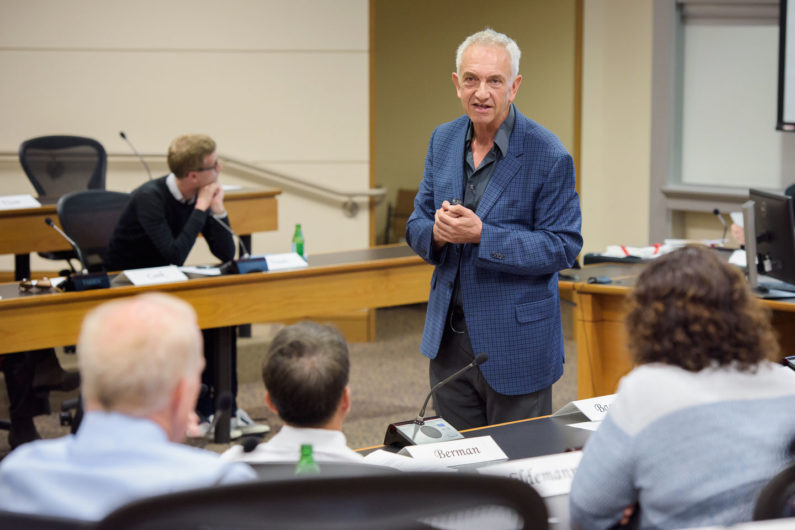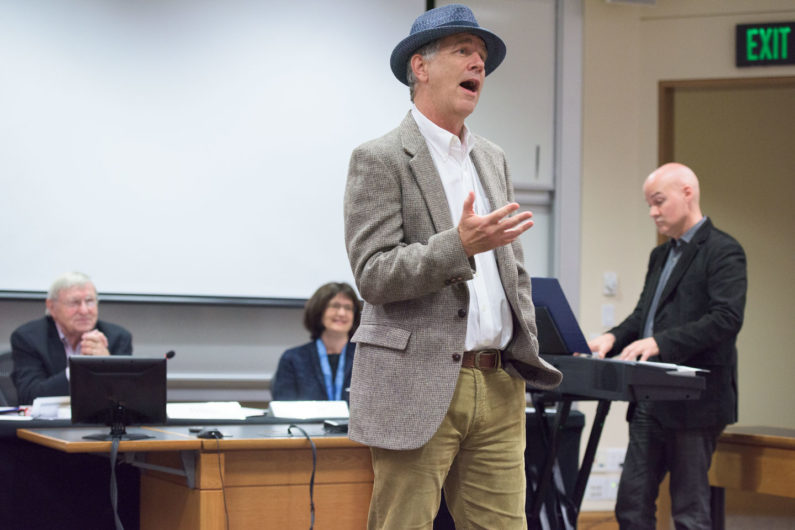Faculty Senate hears report on the impact of housing costs on Stanford
The Faculty Senate on Thursday discussed how rising housing costs affect Stanford as it seeks to continue to attract scholars of the world’s highest caliber.
At Thursday’s Faculty Senate meeting, discussion focused on how high housing costs create hardships for Stanford scholars, students and employees, and what may be done about it.
Russell Berman, chair of the senate’s Policy and Planning Board, delivered the presentation on the dramatic impact of the housing crisis at the last meeting of the 48th Senate of Stanford’s Academic Council.

Professor Russell Berman, chair of the Policy and Planning Board, gives a report to the Faculty Senate on how the Bay Area’s high housing costs affect the university. (Image credit: L.A. Cicero)
Housing is a continuing problem for faculty, students – especially graduate students – postdocs and staff, said Berman, a professor of German studies and of comparative literature. He pointed out that the ability to attract the best scholars in the world is essential to Stanford’s future. Simply, housing costs affect the recruitment of faculty, graduate students, postdocs and staff.
Berman acknowledge the generosity of the university in what it is currently doing to expand housing, but noted that despite the many advantages that Stanford offers, it still faces a profound challenge in an extremely expensive housing market.
“A lot is at stake,” he said. The key is to work on how to provide affordable housing in sustainable ways for the future, he added.
“What would a sustainable Stanford community look like in 25 to 30 years, and how do we plan for it?” Berman said.
After discussion, the senate approved a motion that calls on the university to “further expand on-campus housing; to strive to offer affordable housing to all graduate students, preferably on campus, and to engage the faculty in assessing and managing the increase in the number of graduate students; to conceive and deliver efficient and sustainable transportation options to enable all members of the university to live in more affordable areas when on-campus or near-campus housing is not available.”
The motion also suggested “faculty involvement in the development of future solutions and in setting priorities for the use of finite resources.”
An innovative approach to the issue is encouraged, the Policy and Planning Board wrote in a May 24 statement: “We have the expertise and imagination to invent the Stanford community’s future of sustainable living. We are grateful for all that Stanford has done to address housing needs. Yet housing costs continue to rise.”
The meeting was the last one for John Hennessy in his position as Stanford president; he is stepping down Aug. 31. “My parting advice is to cherish your senate. It is the foundation of our shared governance model,” he said.

Senate Vice Chair James Campbell, as Henry Higgins, sings a modified version of “I’ve Grown Accustomed to Her Face” to outgoing Faculty Senate Chair Kam Moler at the final meeting of the 48th Senate. (Image credit: L.A. Cicero)
In a musical skit, James Campbell, a professor of history and vice chair of the senate, serenaded outgoing senate Chair Kathryn “Kam” Moler, a professor of physics and of applied physics, for her work leading the body the past year.
The full minutes of the June 9 meeting will be available online soon. The next senate meeting is scheduled for Oct. 8. The chair of the 49th Senate is Debra Satz, professor of philosophy.
